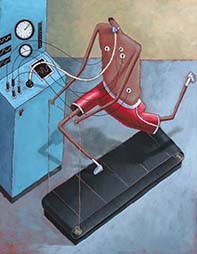Innocence revisited – 29
Dr Sanjiva Wijesinha’s anecdote reminds us not to doubt the unexpected.
Naveen is tall, dark and as slim as the proverbial beanpole. He has been my friend since we were kids at kindergarten, and considers me to be his family doctor on the rare occasions that he needs medical attention (which, more often than not, is just a request for a medical certificate).
As a child he had always been sensitive, but over the years he has developed a veneer of stoic toughness, and to his acquaintances appears to be an average, unemotional man.
I was surprised one Saturday morning, therefore, to find that he and his wife had made an appointment to see me. After we had gone through the usual preliminaries, Naveen said apologetically, ‘Nothing serious, mate, but Katie insisted I get you to check me out’.
It transpired that Naveen had experienced a few episodes of epigastric discomfort – not strong enough to be termed chest pain, but still sufficiently uncomfortable for him to mention it to his wife. They didn’t happen often, he admitted sheepishly, ‘only when I get upset – like last night, when I had an argument with our teenage son’.
An unremarkable history
Naveen had no significant medical history; he had never smoked, hardly drank, used to go jogging three times a week and was reasonably sensible with his food. As far as I knew there were no major domestic problems. The only item in his background worth noting was a family history of heart disease. His father and paternal uncles had all died of cardiovascular problems – two after heart attacks and one of renal failure following bypass surgery. Probably because of this family history, Naveen had always been concerned about preventing heart disease: he was careful about his diet and maintained regular exercise.
I went through my usual checklist for chest pain: he had neither nausea, light-headedness, sweating nor any other accompanying features worth talking about. The discomfort only came on when he was upset. It never came on when he was exercising: he could jog for 20 to 30 minutes without any symptoms. His pulse, blood pressure and heart sounds were all normal.
‘Could it be due to his heart?’ asked Naveen’s wife.
‘They all have heart problems on their side of the family.’
I assured her that this was most unlikely, given the story, but just to be safe I did an ECG (which turned out to be normal) and ordered blood tests.
‘What about doing one of those heart exercise tests?’ she persisted. I had learnt over the years that one does not disagree with Katie without good reason. So, purely to maintain diplomatic relations, I gave in. ‘OK. I don’t think it will show anything but let’s get one done – then we can be absolutely sure that there is no coronary cause for the symptoms.’ I proceeded to write out a request for an exercise stress test.
A week later the results arrived. Much to my surprise, they showed the typical features of cardiac ischaemia coming on after nine minutes – ST depression in leads II, III and a-VF.
I promptly phoned my favourite cardiologist and arranged an appointment for Naveen.
An angiogram showed a normal left coronary artery, but significant narrowing in the distal part of the right coronary. These blockages were not suitable for angioplasty, so Naveen was prescribed what I term ‘Triple A Therapy’ – atenolol, aspirin and atorvastatin – and now carries a bottle of glyceryl trinitrate spray with him at all times. He still exercises regularly, although these days he follows the cardiologist’s instructions to ‘walk, don’t run’.
Some stressful thoughts
It was Naveen’s wife who had the last word, as usual.
‘You doctors’, she said. ‘You always like to measure everything – blood pressure, cholesterol, height, weight, amount of exercise, amount of fat in the diet, number of cigarettes smoked each day. But if you can’t make quantitative measurements of things, like emotional upheaval or sadness or loneliness, then you ignore them. I am sure that there is as much heart disease caused by emotional problems as there is by high cholesterol and high blood pressure.’
Being a discreet rather than a valiant man, I never disagree with Katie, even when I know she is wrong … but this time I think she might be right. MT

